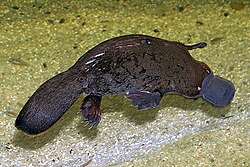鴨嘴
Jump to navigation
Jump to search
Chinese[edit]
| duck | mouth | ||
|---|---|---|---|
| trad. (鴨嘴) | 鴨 | 嘴 | |
| simp. (鸭嘴) | 鸭 | 嘴 | |
Pronunciation[edit]
Noun[edit]
鴨嘴
- bill of a duck
- (figurative, informal) Short for 鴨嘴器/鸭嘴器 (yāzuǐqì, “speculum used in gynaecological examinations”).
Derived terms[edit]
Japanese[edit]


| Kanji in this term | |
|---|---|
| 鴨 | 嘴 |
| かも(の) Jinmeiyō |
はし Hyōgaiji |
| kun’yomi | |
Etymology[edit]
Compound of 鴨 (kamo, “duck”) + の (no, possessive particle) + 嘴 (hashi, “bill, beak”). The の (no) is omitted in the spelling.
The platypus sense is a calque of English duck-billed platypus.
Pronunciation[edit]
- (Tokyo) かものはし [kàmó nóꜜ hàshì] (Nakadaka – [3])[1][2][3]
- (Tokyo) かものはし [káꜜmò nò hàshì] (Atamadaka – [1])[1][3]
- IPA(key): [ka̠mo̞ no̞ ha̠ɕi]
Noun[edit]
鴨嘴 or 鴨嘴 • (kamo no hashi)
- a platypus
- a. 2012, カモノハシペリーのテーマ (Perry the Platypus theme song):
- オー ペリー カモノハシペリー!
エージェントピーと呼びまえ
ペリー!
だからエージェントPだってのに
エージェントP!- Ō perī kamo no hashi perī!
ējento pī to yobimae
perī!
dakara ējento P datte noni
ējento P! - Oh, Perry, Perry the Platypus!
But you can call him Agent P
Perry!
I said you can call him Agent P
Agent P!
- Ō perī kamo no hashi perī!
- オー ペリー カモノハシペリー!
- a. 2012, カモノハシペリーのテーマ (Perry the Platypus theme song):
- Ischaemum aristatum var. glaucum, a kind of smutgrass or batiki bluegrass
Usage notes[edit]
As with many terms that name organisms, this term is often spelled in katakana, especially in biological contexts (where katakana is customary), as カモノハシ.
References[edit]
- ↑ 1.0 1.1 NHK Broadcasting Culture Research Institute, editor (1998), NHK日本語発音アクセント辞典 [NHK Japanese Pronunciation Accent Dictionary] (in Japanese), Tōkyō: NHK Publishing, →ISBN
- ^ Kindaichi, Kyōsuke et al., editors (1997), 新明解国語辞典 (in Japanese), Fifth edition, Tōkyō: Sanseidō, →ISBN
- ↑ 3.0 3.1 Matsumura, Akira, editor (2006), 大辞林 (in Japanese), Third edition, Tōkyō: Sanseidō, →ISBN
Further reading[edit]
Categories:
- Chinese lemmas
- Mandarin lemmas
- Cantonese lemmas
- Chinese nouns
- Mandarin nouns
- Cantonese nouns
- Chinese terms with IPA pronunciation
- Chinese informal terms
- Chinese short forms
- Japanese terms spelled with 鴨
- Japanese terms spelled with 嘴
- Japanese terms read with kun'yomi
- Japanese compound terms
- Japanese terms calqued from English
- Japanese terms derived from English
- Japanese terms with IPA pronunciation
- Japanese lemmas
- Japanese nouns
- Japanese terms with multiple readings
- Japanese terms spelled with jinmeiyō kanji
- Japanese terms spelled with hyōgaiji kanji
- Japanese terms written with two Han script characters
- Japanese terms with usage examples
- ja:Monotremes
- ja:Grasses
